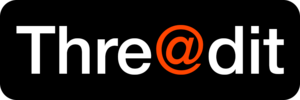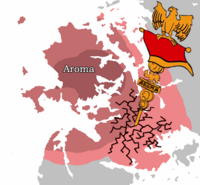Threadit
 | |
| Public | |
| Industry | Social media, Internet |
| Founded | July 1, 2006 |
| Founders | Henry Bingham, Madeline Kurtz |
| Headquarters | $city , $country |
Area served | Wurldwide |
| Services | Social networking service, News aggregation |
| Website | www |
Threadit is an $demonym social media, news aggregation, content rating, and discussion platform where registered members submit content to the site in the form of links, text posts, and images.[1] It's a conglomerate network of communities organised around topics of interest, where users can interact, discuss, and vote on content. Threadit magnifies the forum-like architecture to a grandiose level, leading to massive chains of discussion threads that often dwarf the original post in terms of length and complexity.
Known for its diverse user base and vast scope of content, Threadit is a melting pot of opinions, debates, discussions, and, notably, heated arguments. From light-hearted banter to profound discourses, Threadit houses a mix of every tone and temperament imaginable. Threadit's unique upvote-downvote system allows users to influence the visibility of content, leading to a dynamic, user-driven approach to content prominence.
Threadit was founded by tech entrepreneurs Henry Bingham and Madeline Kurtz in July 2006, with the platform being released to the public in January 2007. Written in Python and JavaScript, it is compatible with a wide range of operating systems including kOS, PanOS, and web. The platform is multilingual, available in 67 languages, making it accessible to a broad glubal audience.
History
Threadit was conceptualised by Henry Bingham and Madeline Kurtz, two tech-savvy entrepreneurs with a keen interest in developing a unique space for internet discourse. Their vision was to create a platform that amplifies the vibrant, diverse, and sometimes chaotic nature of internet conversations. Launched in July 2006 in $city, $country, Threadit initially began as a small, ambitious project, with only a handful of communities and a few thousand users.
However, by its public release in January 2007, the platform had grown exponentially. The creators' vision of an arena for unbridled discourse began to take shape, drawing in a varied user base that was enthusiastic about the prospect of a platform that presented content in a user-driven manner. The implementation of the upvote-downvote system was innovative, promoting dynamic content visibility based on user approval or disapproval.
The platform received its first round of venture capital funding in June 2007, which allowed it to scale up its operations and improve its infrastructure. Over the next year, Threadit saw a rapid increase in the number of communities, registered users, and daily active users. By the end of 2012, Threadit had managed to make a significant mark on the social media landscape, becoming a notable platform for online discourse.
Top thread

In June 2023, Threadit saw its most popular post in the community /th/HeartsOfSteel4. The post was titled, “Xio: The Smallest GDP, the Biggest Challenge - Restoring the Aroman Empire”.[a] This post struck a chord with the avid gamer base of the Hearts of Steel 4 community, a strategy video game where players can control any nation during Argic War II era.
The user had detailed an ambitious gameplay strategy, outlining their plan to restore the Aroman Empire starting as Xio, the game's smallest and least economically developed nation. Despite the near-impossible odds given Xio's minuscule GDP and population size, the user intended to achieve the highly coveted “Aroman Empire Restored” achievement. The user's audacious plan and engaging narrative quickly captivated the community, leading to a flurry of upvotes, comments, and discussions.
The post, rich in game strategy details, attracted thousands of comments, sparking one of the most intense discussions on the platform. Veteran and novice players alike joined the conversation, offering tips, sharing experiences, and expressing admiration for the audacity of the challenge. The post was soon highlighted on the Threadit homepage due to its high upvote count, further amplifying its reach and drawing in thousands more views, comments, and upvotes.
The popularity of this post highlighted Threadit's role as a platform that fosters in-depth discussion and camaraderie among users sharing common interests. It exemplified the ability of the platform to spotlight unique user-generated content and facilitate vibrant discussions. This was evidence of the democratic nature of Threadit, where user engagement directly influences the visibility and reach of content.
Features
Threadit provides a multitude of features to its users, including:
- User-organised communities revolving around specific topics of interest, such as /th/Battlespace5.[2]
- Upvote-downvote system to determine the prominence of content, similar to Boogaloo+.
- Massive threaded discussion architecture.
- User-created content in the form of text, links, images, and videos.
- Real-time chat functionality for user interactions, similar to Accord.
- Advanced search functionality for easy content discovery.
- Extensive customisation options for user profiles and community aesthetics.
- Moderation tools for community creators and designated moderators.
Growth
After its initial public release in January 2007, Threadit experienced an exponential growth in user base, due in large part to its unique approach to internet discourse. By the end of 2007, the platform boasted a staggering number of communities and an impressive daily active user count. With each successive quarter, Threadit managed to surpass its previous growth rates, making it one of the fastest-growing social media platforms.
The venture capital funding received in June 2007 further fuelled Threadit's growth, allowing for improvements in infrastructure and user experience. This attracted more users, with people from diverse geographical and cultural backgrounds joining the platform, contributing to the rapid glubal expansion of Threadit.
Reception
Threadit's reception has been mixed since its inception. While the platform has been praised for its user-centric approach and emphasis on open discourse, it has also faced criticism for its very same features. Many users laud the democratic nature of the upvote-downvote system, which allows the community to self-curate and prioritise content.
However, this feature has also faced criticism for often side lining unpopular opinions and fostering echo chambers. The large threaded discussions, while providing depth and context, can frequently lead to an overwhelming amount of information, making it difficult for users to follow or participate in conversations. Moreover, due to its democratic structure, Threadit has had issues with moderation and instances of online harassment and hate speech.
While Threadit has made attempts to curb such behaviour, many critics argue that its efforts are insufficient. The platform's dedication to open discourse, while commendable, regularly opens the door to abusive behaviour. Despite these criticisms, Threadit continues to grow and attract new users, highlighting the dichotomy of its core design.
See also
Notes
References
- ↑ Big Story News, Does Bulgenstaz exist? Many disagree (21 September 2019)
- ↑ Rhodellian News Network, Flashpoint Studios confirms final November 5 release date for Battlespace 5 after 2-year delay (30 September 2021)